What problems did they have with the middle third, then?
My 2024 Watchlist Obsession!
→ in Movie Reviews
X
Favorite Movies
X
User Lists
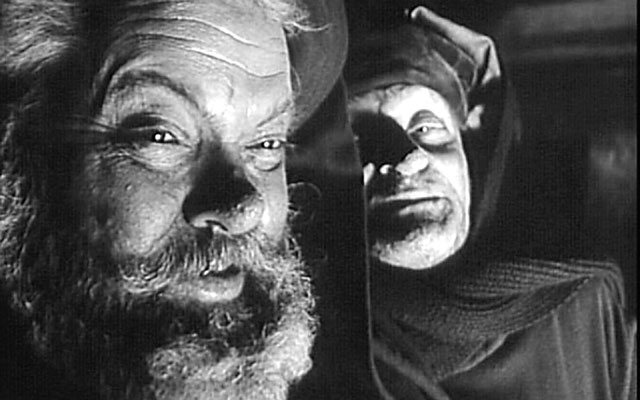
CHIMES AT MIDNIGHT (1965)
Directed by : Orson Welles
I'll never forget Chimes at Midnight - mostly because of how stuck I've been with it for what feels like forever. I've been ill, and I pushed everything aside to just rest and get better - but the minute I felt well enough to sit through the film and then write something about it I find out my sister is in intensive care, and perhaps is not going to make it. She's been battling leukaemia, and doing so well - but apparently beating that has robbed her of her biological defenses, and we nearly lost her. I could write nothing - just think of her. I dreaded the news this morning - but she's awake and talking and I'm well enough to start this stalled enterprise once again! Unfortunately my familiarity with Shakespeare doesn't extend to the 'Wars of the Roses' cycle of plays - so I don't have any kind of grounding when it comes to the character of Falstaff (who Welles plays in Chimes at Midnight.) I tried to familiarize myself as much as I could with the plot by reading a bit about it, for I knew if the dialogue was going to be Shakespearean in nature I might find myself becoming a mite lost. That did happen in places, even though I pretty much knew what was going on in general.
While I had a hard time following this, I was the most impressed I've ever been when it comes to how Welles has brought his vision to life through cinematography and editing. There is a never-ending pageantry of great shots, bristling with creativity and providing me with something special to focus on - something I was thankful for. The "Battle of Shrewsbury" part of the movie is exceptional, but Welles makes sure that it doesn't make the movie uneven for most everything in Chimes at Midnight is given emphasis and weight simply by the way it's filmed and framed. Falstaff is a scamp. A loveable rogue who, despite being a thief, drunkard and more, has taken the young Prince Hal (Keith Baxter) under his wing - much to the consternation of King Henry IV (John Gielgud). The king is in the meantime preoccupied with a rebellion led by Henry Percy - otherwise known as Hotspur (Norman Rodway) - something that leads to the aforementioned battle. Will Prince Hal prove himself worthy of his father's crown? Orson disappears into his larger than life role here - he really did have exceptional talent in a theatrical sense. A sixth sense about what was needed in any given situation.
Overall, considering how wrecked I feel, I don't think I was able to give Chimes at Midnight it's full due - but I could still manage to see what it's most passionate adherents love about it. If only there were CliffsNotes for me to use. I wonder if there will be future occasions where I watch this and start grasping everything that's said in it, instead of barely anything. I'm not even quite sure if everything in it comes directly from The Bard, or if there's connective tissue written by Welles in Shakespeare's signature style. Why everyone has to talk in lyric-soaked riddles and make their general conversation poetry is beyond me - but it is what it is, and as such there are those of us who will struggle with it. I wonder why I was so eager to put it on my watchlist, considering how much of a challenge it was - perhaps just so I could appreciate how well made it was, and get another step closer to having seen everything Orson Welles made. I think I've heard the chimes at midnight - or perhaps it's just been a trying week or so.
Glad to catch this one - #830 on Criterion and in Steven Jay Schneider's 1001 Movies You Must See Before You Die.
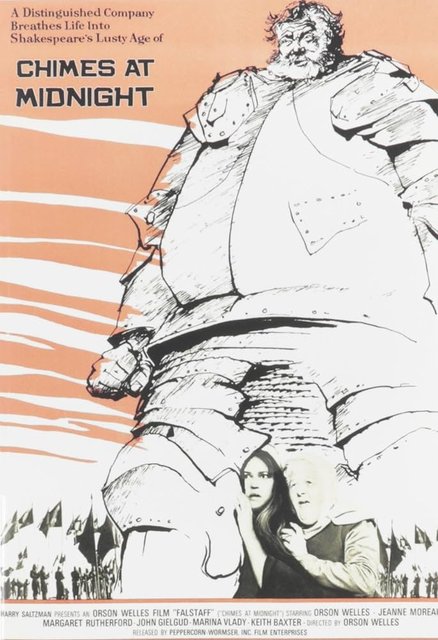
Watchlist Count : 429 (-21)
Next : The Phantom Carriage (1921)
Next : The Phantom Carriage (1921)
Thank you very much to whomever inspired me to watch Chimes at Midnight.
__________________
Remember - everything has an ending except hope, and sausages - they have two.
We miss you Takoma
We miss you Takoma
Latest Review : There Will Be Blood (2007)
X
Favorite Movies
X
User Lists
Easily my favorite Shakespeare adaptation. I think your reaction is similar to my initial reaction, but it's the kind of film which gets better with rewatches once you understand more of, well, what goes on.
X
Favorite Movies
X
User Lists
I don't know shit about Shakespeare. I guarantee I missed about 80 percent of what Chimes of Midnight offered. But that's enough.
Yet another example of why Welles was better than most at everything. Except success.
Yet another example of why Welles was better than most at everything. Except success.
X
Favorite Movies
X
User Lists
I haven’t seen Chines at Midnight yet, but I understand it’s considered by many, including Welles himself, to be his best. It’s a shame it wasn’t highly regarded at the time of its release
X
Favorite Movies
X
User Lists

THE PHANTOM CARRIAGE (1921)
Directed by : Victor Sjöström
Another movie, another tremendously different experience because this comes from such a faraway time and place. Director/star Victor Sjöström is actually the guy from Ingmar Bergman's Wild Strawberries, and The Phantom Carriage was one of the Swedish filmmaker's favourite films. You've gotta be curious - features were such a new phenomenon, and this one's structure at first took me aback. It starts with a dying Salvation Army Sister's dying wish to see a particular man, and as people go out to search for him we find him first - telling a story about a man he once knew a while back. We transfer ourselves to that time and place, and before you know it this new person starts telling his own story. Now we're within a story that's within it's own story being told by a man that people are searching for. Once familiarized with the film, it all makes perfect sense - but the first time around you feel you only have the most tenuous grasp on The Phantom Carriage's narrative. It's not a complex tale, but it's told in nonlinear fashion, with many flashbacks and different points of view.
So, the spectral carriage itself is driven by a new person every year - someone who dies on the stroke of New Years, who will be cursed to act as Death himself. Every night as this carriage driver lasts 100 years from a person's perspective - it's a real cruddy job, and this particular year the driver is Georges (Tore Svennberg) - a friend of David Holm (Victor Sjöström), who is the man being sought by the dying Salvation Army nurse with consumption. David is an alcoholic who has caused nothing but misery for his brother, wife and two children - and this nurse had taken his cause up to only be let down and rebuffed by David time and time again. Well, it turns out David has just died - on the stroke of midnight on New Year's Eve wouldn't you know it, and is being inducted into his new job by Georges - who wants to take him to see the nurse, and show him things much like the three ghosts do in A Christmas Carol. You see, David's wife is about to poison the kids and kill herself - having had enough of the drama. Is it too late, considering that David is now a ghost? I won't spoil anything - I guess it depends on the rules and regulations regarding this Phantom Carriage, which collects souls over a year that lasts (*gets calculator out*) a seeming 36,500 years for the poor soul which has to operate it one human year.
This was really interesting from a film fan's point of view. It's not so easy watching this, because it's dialogue heavy, and you always have to watch characters natter away and wait...and wait...until intertitles finally pop up, with the Swedish text translated for us (I do prefer that authentic touch.) Sometimes we're left to figure out what characters are saying ourselves - and they do gesticulate more than normal people would do - it's very theatrical. Still, it's well shot, although I prefer straight black and white to the many colour tints we get throughout this film. Victor Sjöström is a force of nature, and bellows through the film whether he's drunk, or possessed with emotional desperation - it's a fiery performance. I also liked the nurse, played by Astrid Holm - these were all famous, well-regarded Swedish stars of the stage and screen. I didn't know Swedish cinema was as well established as it seems to have been in 1921 - but The Phantom Carriage seems to be the biggest title of this period - a central work from the biggest name in Swedish film, Victor Sjöström. A fascinating peep through a time gap that now extends past a century.
Glad to catch this one - #579 on Criterion and in Steven Jay Schneider's 1001 Movies You Must See Before You Die. It's notable for it's double-exposure special effects, and was released on New Year's Day 1921.
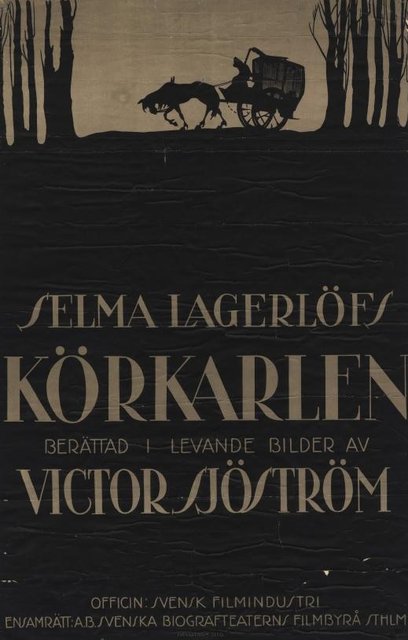
Watchlist Count : 433 (-17)
Next : A Visitor to a Museum (1989)
Next : A Visitor to a Museum (1989)
Thank you very much to whomever inspired me to watch The Phantom Carriage.
X
Favorite Movies
X
User Lists
I haven’t seen Chines at Midnight yet, but I understand it’s considered by many, including Welles himself, to be his best. It’s a shame it wasn’t highly regarded at the time of its release
Is it a shame that Welles didn't get the full wallop of proper recognition in his lifetime? Sort of. I'm sure Welles never doubted what he was though, even though he probably at times resented how frequently he was considered a washed up has been or charlatan.
But he got to make 23 films. Nearly all of them worthy of his legend. And he did it while very rarely compromising his pretty uncompromising vision. If the guy really truly wanted to be a consistent success in his time, I'm sure he could have figured out how to do that. But he would have had to be a smaller and less adventurous man, and it would have shown in his work. Instead, he chose to go where his own instinct took him, and that is why he is remembered. So, I'm sure on some level he must have accepted this fate. Even though I do imagine it was frustrating at times.
With very few exceptions, you don't end up mattering if you try to appeal to everyone. The two things rarely go together. So, I guess we should be thankful that he proceeded exactly as he did, and burned all of those bridges, and got himself laughed into frozen pea commercials.
The tragedy of Orson Welles is very small, compared to the largeness of everything else about him.
X
Favorite Movies
X
User Lists
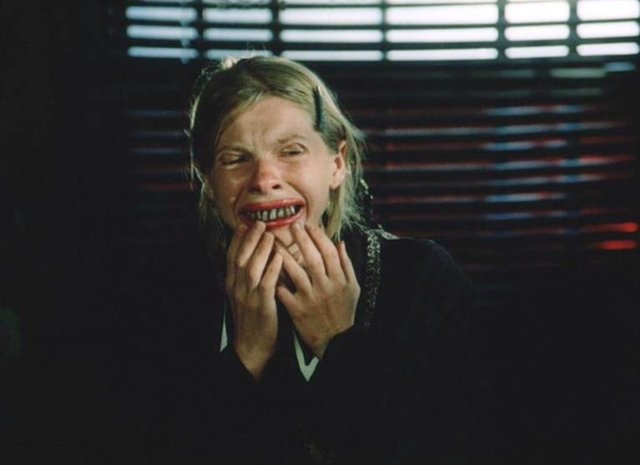
A VISITOR OF A MUSEUM (1989)
Directed by : Konstantin Lopushansky
The religious no longer say "Amen" in Konstantin Lopushansky's nightmare world created for A Visitor of a Museum (sometimes called Visitor to a Museum.) They say "Let us out." Interesting too that there's a dividing line between those who practice faith and those who seem content watching television and dancing - the former are "degenerates", or mentally ill. Some in his native Russia criticized Lopushansky for lacking a sense of humour, unlike say, a Terry Gilliam - but his post-apocalyptic dystopias thrived on their own severity, and anything funny would have seemed particularly out of place. I still remember his previous film, Dead Man’s Letters, which took place after nuclear Armageddon - this time it's more of an environmental collapse that has left mankind clinging on desperately to a trash-filled, broken, unpredictable existence. Ocean tides flow in and out to such great degrees that abandoned cities can only be explored at certain times - and there's a museum which a man known only as "The Visitor" (Viktor Mikhailov) is determined to see while he's on vacation. It's a trip that will test his sanity, and see him come into contact with the tenuous remnants of a people completely broken - the inheritors of a rubbish dump of a planet, where beauty is a thing of the past.
You can tell that Lopushansky studied under Andrei Tarkovsky - there's that same kind of co-opting of unusual environs, repurposed to represent something new. A world of endless rubbish, deterioration, fire and encroaching ocean. It's a dark world, both literally and figuratively - and that's why The Visitor thinks it hilariously ironic that it's here he's chosen to spend his vacation time. Even the train is simply known as the "dump train" - it's broken down carriages transporting more garbage and dirt than people. It's a violent world, although we rarely see that violence. Religious hysteria also bubbles away under the surface - but it's kept out of sight, with the ruling class sedated by television. A lot of this is pretty dour - with The Visitor waiting at a run down hotel for the tides to change so he can travel to where he wants to go - a trip that will unexpectedly become something of a religious pilgrimage for him after he becomes a target for the cult-like movement the "Degenerate Maid" (Irina Rakshina) belongs to. It becomes a transformative experience, and The Visitor something of a Christ-like figure.
I wasn't so sure of A Visitor of a Museum until I saw it's particularly powerful final scenes and everything seemed to fit neatly into place. Up until then there's such a miserable stasis that the film was testing my patience - a dogged sadness, mixed with failure, dirt, despair, indifference, darkness and desperation. Lopushansky wants to show us a humanity that's long, long past the point of no return, where redemption has become a purely personal matter. With no cause left worth fighting for, the only escape for the lonely is either dogma or mindless entertainment. I don't know how much of humanity remains, but it seems not at all too different from the nuclear wasteland of Dead Man's Letters. It's harsh watching that in such an unrelenting manner, especially when characters just start lingering and losing their motivation. When the tide went out, I thought The Visitor might not even bother going to his museum - which would have upset me. In the end though, the whole carcass of refuse, waste and destruction was under my skin anyway. My anguish matched the pinpoint spot that Lopushansky was aiming for.
Glad to catch this one - it was entered into the 16th Moscow International Film Festival where it won the Silver St. George and the Prix of Ecumenical Jury..
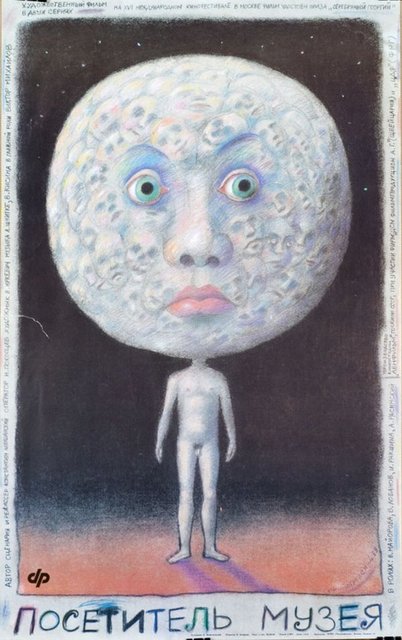
Watchlist Count : 432 (-18)
Next : The Ruins (2008)
Next : The Ruins (2008)
Thank you very much to whomever inspired me to watch A Visitor of a Museum.
X
Favorite Movies
X
User Lists

THE RUINS (2008)
Directed by : Carter Smith
Damn films where the whole premise is a spoiler that's revealed a quarter of the way into the movie - forcing me to tip-toe my way up to it and then write around the central thing that's happening. Anyway - four American travellers are holidaying in Mexico when a German tourist invites them to visit some Mayan ruins with him - once there they're forbidden to leave by some gun-wielding locals. Why? Because the ruins have a ghoulish, deadly secret to them that's basically staring you right in the face from the beginning. Something spreadable. Trapped, they're forced to treat serious injuries suffered when two of them fall down a central shaft, looking for the friends they were supposed to be meeting there. There are forced leg-amputations and some impromptu surgery necessitated by medical emergencies - and then there's that creepy something which keeps threatening the lives and sanity of the kids who can't leave this ancient abode. It's a tale of survival and investigation, and it's kind of a shame the characters aren't a little more interesting, because there's not much more to this 2008 horror film from Carter Smith.
Whenever you're exploring a foreign country, and a taxi driver tells you that the place you want to go to is "a really bad place", I know it's tempting. For some strange reason, tourists feel immune and impervious to danger in foreign lands - as if you have to live there officially to be touched by whatever evil is laying in wait. The kids in this film actually get to declare their invincible "we're Americans!" status, except for Mathias (Joe Anderson), the German, who is the one who is heading down into the temple when the rope holding him breaks. Despite him sorrowfully declaring that he can no longer feel his legs, our four intrepid explorers feel the need to drag him out of the temple - and in pretty short order cut his legs off to prevent infection or something. Turns out he can feel his legs! These kids hardly need any kind of horrendous outside threat - they're dangerous enough to themselves - but after a night on the temple they discover something very creepy happening. They can't leave, because they're surrounded by an armed force - and none of them can speak Spanish, so the bullets and arrows do the talking.
So - five characters are trying to survive on the temple, and what's pretty damning for this movie is the fact that I know one thing : one of them, Jeff (Jonathan Tucker), is studying to become a doctor. That's the only thing I picked up about any of the characters. There is not one other identifying feature about the characters that I can mention after watching the film - their blandness is stultifying. Oh - Amy (Jena Malone) drinks too much, and flirts when she's drunk - other than that these are very random human beings that I seriously don't care all that much about, despite the moments of gore which gave me a visceral empathetic reaction to people being harmed. I'm kind of surprised that this is based on a novel - written by Scott Smith, the author of A Simple Plan. Smith wrote the screenplay, (and also adapted A Simple Plan, which earned him a Best Adapted Screenplay Oscar nomination.) There was no nomination for The Ruins - there's simply not enough to it, despite it's winning, creepy premise which I won't mention for fear of spoiling it. There should be more meat on this film's bones - it feels light on, like an episode to an anthology show.
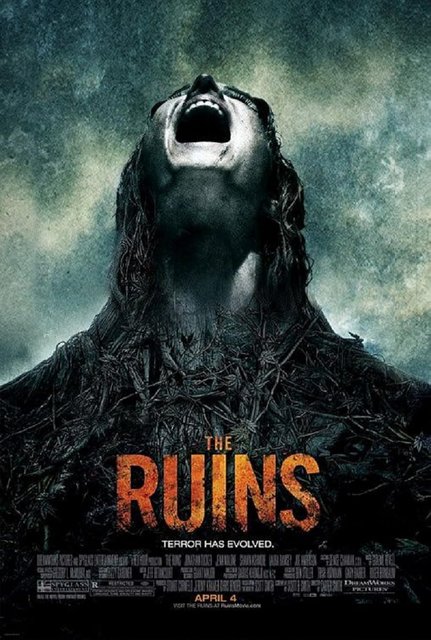
Watchlist Count : 431 (-19)
Next : The Devils (1971)
Next : The Devils (1971)
Thank you to whomever inspired me to watch The Ruins.
X
Favorite Movies
X
User Lists
I can't for the life of me remember if I've seen The Ruins but I really liked Scott Smith's novel.
X
Favorite Movies
X
User Lists
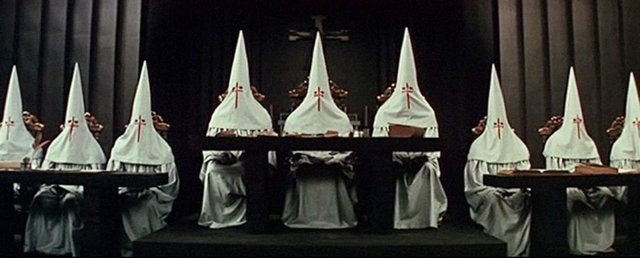
THE DEVILS (1971)
Directed by : Ken Russell
I'm thinking I should check out more of Ken Russell's films - his unflinching look at the absurd political power inquisitors could wield in 17th Century France combines sexual repression and corruption in a fiery, fierce film. It tells the real-life story of Father Urbain Grandier (Oliver Reed) - a French Catholic priest who wielded some power and influence in Loudun, and ended up getting tortured and burned at the stake after being accused of witchcraft. His accusers were a group of nuns, chief among them Sister Jeanne des Anges (Vanessa Redgrave), who in the film harbours deeply felt sexual desires for Grandier. The trouble starts when she discovers that he's married another woman, after refusing to become her convent's new confessor - two rejections which compel the Sister to go along with the Baron de Laubardemont (Dudley Sutton) and Father Pierre Barre (Michael Gothard) with their plans to have him tried for bewitching her and the nuns in her Ursuline convent. Grandier's own pride and libido have already made him many enemies, despite his efforts to protect his fortified town from destruction, and soliciting the protection of King Louis XIII (Graham Armitage).
Nobody was really ready for The Devils' sexuality when the film came out in 1971 - and it was that aspect which overshadowed it's brilliance so completely that nearly every influential critic rubbished it upon release. While it might seem tame today, you could arguably say that there might be an excess of boobs throughout the middle portion of the film - and certainly enough to satiate anyone who wants to watch The Devils for purely prurient reasons. What probably disturbed some the most was Russell's dogged attempts at sacrilege, with nuns masturbating with crucifixes and using statues of Christ to pleasure themselves - and Redgrave gets to work with Grandier's charcoaled femur during the film's closing stages. Sex is a source of pride and power in The Devils - it both drives most of the characters, influences their decisions, is used to persecute and scandalize and defines a person's spirituality far more than praying and lighting candles can. It's a religion unto itself, and it complicates Father Urbain Grandier to such a degree that he becomes a fascinating character - and I have to say that Oliver Reed is particularly good in this, although sometimes he does look a little drunk.
Okay, so I thought The Devils was pretty fantastic - a film of extraordinary power, and one that I found visually outstanding, very well written, and directed with absolute confidence and a complete lack of fear. Vanessa Redgrave's unhinged portrayal of the deformed, hunchbacked Jeanne des Anges clearly defines her as calculating and cruel from the outset, while being tormented by a confused desire that lights the destructive flame which burns Grandier at the stake. Dudley Sutton is also great, wielding his power with conspicuous relish, and I have to mention George and Mildred's Brian Murphy, because his likeable presence appearing in the form of a torturer's assistant tickled me. Most of us know full well how weaponized religion can be when the state decides to use it to persecute people, and the power of religion and sex combined make for a monstrous beast which perverts the sanctity of love, which is what sex and religion are supposed to be all about. It's the ultimate irony, and an irony that's not lost on Ken Russell or the original writer of The Devils of Loudun - Aldous Huxley. A magnificent cinematic achievement.
Glad to catch this one - Ken Russell won Best Director at the 33rd Venice International Film Festival, as well as from the U.S. National Board of Review. The film appears in Steven Jay Schneider's 1001 Movies You Must See Before You Die.

Watchlist Count : 429 (-21)
Next : November (2017)
Next : November (2017)
Thank you very much to whomever inspired me to watch The Devils.
X
Favorite Movies
X